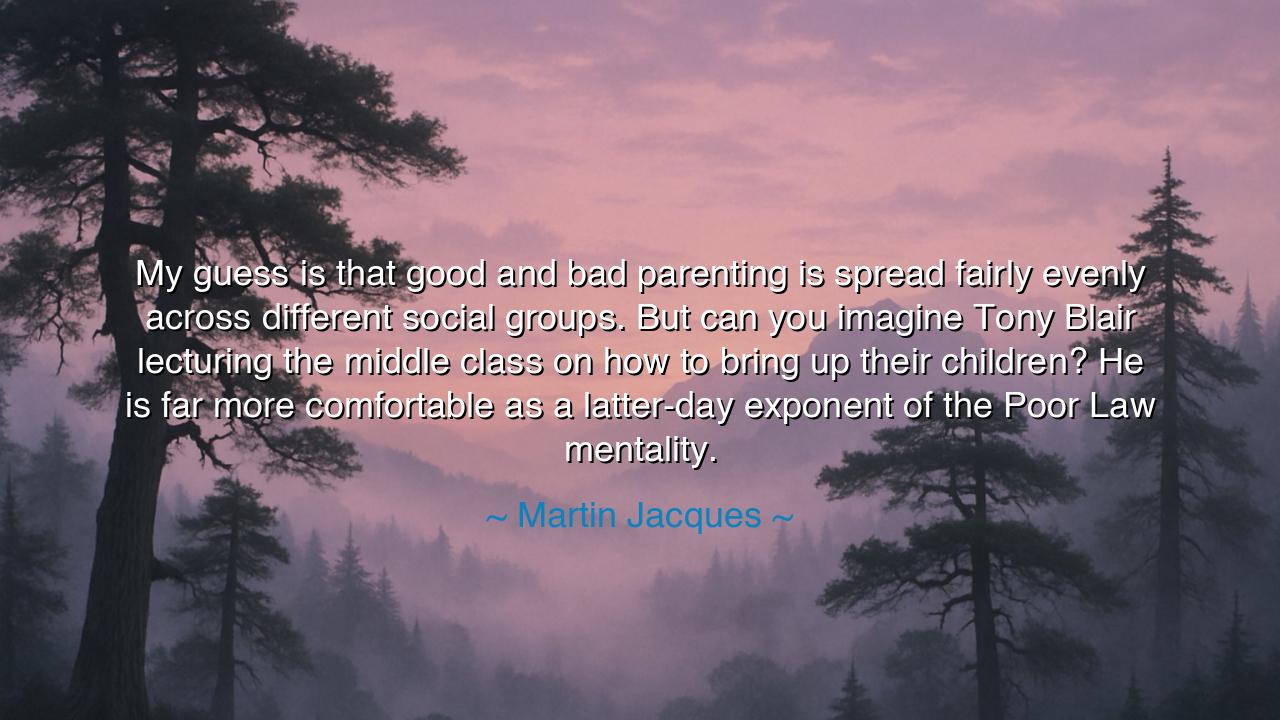
My guess is that good and bad parenting is spread fairly evenly
My guess is that good and bad parenting is spread fairly evenly across different social groups. But can you imagine Tony Blair lecturing the middle class on how to bring up their children? He is far more comfortable as a latter-day exponent of the Poor Law mentality.






Hearken, O seekers of wisdom, to the keen reflection of Martin Jacques, who casts his discerning eye upon the realm of parenting and the illusions of authority that often surround it. He observes that the art of raising children—both good and bad parenting—is dispersed across all social groups, transcending wealth, class, or station. Yet society, he laments, is quick to elevate certain voices while dismissing others, often imbuing the politically prominent with unwarranted authority over the intimate labors of the home. In his words, we glimpse the ancient tension between power, expertise, and the humble craft of raising the young.
The origin of this insight emerges from the intersection of societal expectation and lived reality. Across the ages, rulers, magistrates, and thinkers have sought to prescribe virtue and instruction, yet the raising of children has always been an intimate labor, informed by love, experience, and moral discernment rather than decree. Jacques invokes Tony Blair not merely as a political figure, but as a symbol of those who, comfortable in public pedagogy, might venture to lecture on domestic nurture while being more at ease in the sphere of social management, reminiscent of the Poor Law mentality, with its emphasis on regulation, oversight, and conditional support.
To grasp the depth of Jacques’ observation, consider historical parallels. The Poor Laws of England, enacted to manage poverty and morality, exemplified the dangers of applying distant, systemic judgment to matters of human nurture and domestic life. While the laws sought order and assistance, they often ignored the individuality, dignity, and subtle wisdom present in the household. Jacques’ critique reveals that those accustomed to the administration of policy may falter when confronting the intimate, unpredictable world of family life, where empathy, patience, and nuanced understanding outweigh edicts and protocols.
The emotional resonance of his statement lies in the caution it offers: the measures of a successful parent are not dictated by social class nor endorsed by political authority, but by attentiveness, moral guidance, and the cultivation of character within the child. To be instructed in childrearing by those who have not walked its path is to risk misunderstanding the profound labor involved. Jacques evokes a sense of humility, reminding us that true authority in parenting emerges from practice, reflection, and compassion rather than public stature or policy acumen.
Consider the lives of those who embody this principle. Jane Addams, founder of Hull House in Chicago, devoted herself to the nurturing of children and families across social boundaries, yet she did so not from a pedestal of authority but through immersion, experience, and empathy. Her influence on child development and education was profound because it arose from direct engagement, not from lecturing across societal divides. Here, we see Jacques’ wisdom affirmed: practical, compassionate, and equitable parenting transcends class, politics, and rhetoric.
From this understanding arises a practical lesson: evaluate advice on childrearing not by the speaker’s wealth, position, or fame, but by the depth of their experience, empathy, and attunement to the child’s needs. Resist the allure of distant authority that seeks to impose standards without understanding the intimate dynamics of home life. Instead, cultivate attentiveness, reflection, and moral discernment in your own household, knowing that the labor of nurturing is subtle, patient, and profoundly human.
Jacques’ words also carry a societal warning: the elevation of certain voices over others may perpetuate inequality and misunderstanding. By recognizing that good parenting exists across all social strata, we honor the wisdom inherent in diverse experiences, and we resist the imposition of narrow, class-based ideals upon families whose lives are shaped by different circumstances. This awareness fosters humility, inclusivity, and respect for the myriad ways in which love, discipline, and guidance manifest in homes everywhere.
Thus, the teaching of Martin Jacques endures: parenting is a sacred, intimate craft, dispersed across all social groups, and cannot be fully judged or prescribed by those distant from its practice. Let all who bear the responsibility of raising the young do so with attentiveness, empathy, and moral courage, discerning wisdom from experience rather than prestige or authority. In this, the household becomes a sanctuary of learning, growth, and love, resilient against the illusions of imposed expertise, and rooted in the enduring truth that children flourish best where guidance is compassionate, present, and grounded in lived understanding.






AAdministratorAdministrator
Welcome, honored guests. Please leave a comment, we will respond soon